Mammalian Ste-20-like Kinase 1/2 (MST1/2) Inhibitor XMU-MP-1: A Potential Compound to Improve Spermatogenesis in Mouse Model of Diabetes Mellitus
Abstract
1. Introduction
2. Materials and Methods
2.1. In Vivo Experiments
2.2. Sperm Analysis
2.3. Histological Analysis of Testis Tissues
2.4. Data Analysis
3. Results
3.1. Treatment with XMU-MP1 Improves Sperm Motility
3.2. Effects of STZ-Induced Hyperglycemia on Testicular Phenotypes and Spermatogenesis
3.3. XMU-MP1 May Have a Positive Impact on Sperm Parameters of STZ-Induced Diabetic Mice
4. Discussion
Author Contributions
Funding
Institutional Review Board Statement
Informed Consent Statement
Data Availability Statement
Acknowledgments
Conflicts of Interest
References
- Pathak, U.I.; Gabrielsen, J.S.; Lipshultz, L.I. Cutting-Edge Evaluation of Male Infertility. Urol. Clin. N. Am. 2020, 47, 129–138. [Google Scholar] [CrossRef] [PubMed]
- Levine, H.; Jørgensen, N.; Martino-Andrade, A.; Mendiola, J.; Weksler-Derri, D.; Jolles, M.; Pinotti, R.; Swan, S.H. Temporal Trends in Sperm Count: A Systematic Review and Meta-Regression Analysis of Samples Collected Globally in the 20th and 21st Centuries. Hum. Reprod. Update 2023, 29, 157–176. [Google Scholar] [CrossRef] [PubMed]
- Huang, R.; Chen, J.; Guo, B.; Jiang, C.; Sun, W. Diabetes-Induced Male Infertility: Potential Mechanisms and Treatment Options. Mol. Med. 2024, 30, 11. [Google Scholar] [CrossRef] [PubMed]
- Yanagimachi, R. The Sperm Cell; De Jonge, C.J., Barratt, C.L.R., Eds.; Cambridge University Press: Cambridge, UK, 2017; ISBN 9781316411124. [Google Scholar]
- Williams, A.C.; Ford, W.C.L. The Role of Glucose in Supporting Motility and Capacitation in Human Spermatozoa. J. Androl. 2001, 22, 680–695. [Google Scholar] [CrossRef]
- Bégbin, K.E.; Zougrou, N.E.; Abizi, G.; Kouakou, K.; Jaurès Mangué, N.E. Effects of Diabetes Mellitus on the Reproductive System of Adult Male Mice after One Cycle of Spermatogenesis. Eur. Sci. J. ESJ 2021, 17, 149. [Google Scholar] [CrossRef]
- Chung, S.; Wang, S.P.; Pan, L.; Mitchell, G.; Trasler, J.; Hermo, L. Infertility and Testicular Defects in Hormone-Sensitive Lipase-Deficient Mice. Endocrinology 2001, 142, 4272–4281. [Google Scholar] [CrossRef][Green Version]
- Ramalho-Santos, J.; Amaral, S.; Oliveira, P. Diabetes and the Impairment of Reproductive Function: Possible Role of Mitochondria and Reactive Oxygen Species. Curr. Diabetes Rev. 2008, 4, 46–54. [Google Scholar] [CrossRef] [PubMed]
- Koh, P.-O. Streptozotocin-Induced Diabetes Increases the Interaction of Bad/Bcl-XL and Decreases the Binding of PBad/14–3–3 in Rat Testis. Life Sci. 2007, 81, 1079–1084. [Google Scholar] [CrossRef]
- Koh, P.-O. Streptozotocin-Induced Diabetes Increases Apoptosis through JNK Phosphorylation and Bax Activation in Rat Testes. J. Vet. Med. Sci. 2007, 69, 969–971. [Google Scholar] [CrossRef]
- Fu, M.; Hu, Y.; Lan, T.; Guan, K.-L.; Luo, T.; Luo, M. The Hippo Signalling Pathway and Its Implications in Human Health and Diseases. Signal Transduct. Target. Ther. 2022, 7, 376. [Google Scholar] [CrossRef]
- Fan, B.; Malato, Y.; Calvisi, D.F.; Naqvi, S.; Razumilava, N.; Ribback, S.; Gores, G.J.; Dombrowski, F.; Evert, M.; Chen, X.; et al. Cholangiocarcinomas Can Originate from Hepatocytes in Mice. J. Clin. Investig. 2012, 122, 2911–2915. [Google Scholar] [CrossRef]
- Triastuti, E.; Nugroho, A.B.; Zi, M.; Prehar, S.; Kohar, Y.S.; Bui, T.A.; Stafford, N.; Cartwright, E.J.; Abraham, S.; Oceandy, D. Pharmacological Inhibition of Hippo Pathway, with the Novel Kinase Inhibitor XMU-MP-1, Protects the Heart Against Adverse Effects During Pressure Overload. Br. J. Pharmacol. 2019, 176, 3956–3971. [Google Scholar] [CrossRef] [PubMed]
- Faizah, Z.; Amanda, B.; Ashari, F.Y.; Triastuti, E.; Oxtoby, R.; Rahaju, A.S.; Aziz, M.A.; Lusida, M.I.; Oceandy, D. Treatment with Mammalian Ste-20-like Kinase 1/2 (MST1/2) Inhibitor XMU-MP-1 Improves Glucose Tolerance in Streptozotocin-Induced Diabetes Mice. Molecules 2020, 25, 4381. [Google Scholar] [CrossRef]
- Ardestani, A.; Lupse, B.; Maedler, K. Hippo Signaling: Key Emerging Pathway in Cellular and Whole-Body Metabolism. Trends Endocrinol. Metab. 2018, 29, 492–509. [Google Scholar] [CrossRef]
- Abou Nader, N.; Ménard, A.; Levasseur, A.; St-Jean, G.; Boerboom, D.; Zamberlam, G.; Boyer, A. Targeted Disruption of Lats1 and Lats2 in Mice Impairs Testis Development and Alters Somatic Cell Fate. Int. J. Mol. Sci. 2022, 23, 13585. [Google Scholar] [CrossRef]
- Tan, K.; Song, H.-W.; Wilkinson, M.F. Single-Cell RNAseq Analysis of Testicular Germ and Somatic Cell Development during the Perinatal Period. Development 2020, 147, dev183251. [Google Scholar] [CrossRef]
- Chi, X.; Luo, W.; Song, J.; Li, B.; Su, T.; Yu, M.; Wang, T.; Wang, Z.; Liu, C.; Li, Z.; et al. Kindlin-2 in Sertoli Cells Is Essential for Testis Development and Male Fertility in Mice. Cell Death Dis. 2021, 12, 604. [Google Scholar] [CrossRef] [PubMed]
- Sen Sharma, S.; Vats, A.; Majumdar, S. Regulation of Hippo Pathway Components by FSH in Testis. Reprod. Biol. 2019, 19, 61–66. [Google Scholar] [CrossRef] [PubMed]
- Lalonde-Larue, A.; Boyer, A.; Dos Santos, E.C.; Boerboom, D.; Bernard, D.J.; Zamberlam, G. The Hippo Pathway Effectors YAP and TAZ Regulate LH Release by Pituitary Gonadotrope Cells in Mice. Endocrinology 2022, 163, bqab238. [Google Scholar] [CrossRef]
- Fan, F.; He, Z.; Kong, L.-L.; Chen, Q.; Yuan, Q.; Zhang, S.; Ye, J.; Liu, H.; Sun, X.; Geng, J.; et al. Pharmacological Targeting of Kinases MST1 and MST2 Augments Tissue Repair and Regeneration. Sci. Transl. Med. 2016, 8, 352ra108. [Google Scholar] [CrossRef]
- Ardestani, A.; Paroni, F.; Azizi, Z.; Kaur, S.; Khobragade, V.; Yuan, T.; Frogne, T.; Tao, W.; Oberholzer, J.; Pattou, F.; et al. MST1 Is a Key Regulator of Beta Cell Apoptosis and Dysfunction in Diabetes. Nat. Med. 2014, 20, 385–397. [Google Scholar] [CrossRef] [PubMed]
- Martinez, G. First-Line Evaluation of Sperm Parameters in Mice (Mus musculus). Bio Protoc. 2022, 12, e4529. [Google Scholar] [CrossRef] [PubMed]
- Ballester, J.; Muñoz, M.C.; Domínguez, J.; Rigau, T.; Guinovart, J.J.; Rodríguez-Gil, J.E. Insulin-Dependent Diabetes Affects Testicular Function by FSH- and LH-Linked Mechanisms. J. Androl. 2004, 25, 706–719. [Google Scholar] [CrossRef] [PubMed]
- Schoeller, E.L.; Schon, S.; Moley, K.H. The Effects of Type 1 Diabetes on the Hypothalamic, Pituitary and Testes Axis. Cell Tissue Res. 2012, 349, 839–847. [Google Scholar] [CrossRef]
- German, J.P.; Wisse, B.E.; Thaler, J.P.; Oh-I, S.; Sarruf, D.A.; Ogimoto, K.; Kaiyala, K.J.; Fischer, J.D.; Matsen, M.E.; Taborsky, G.J.; et al. Leptin Deficiency Causes Insulin Resistance Induced by Uncontrolled Diabetes. Diabetes 2010, 59, 1626–1634. [Google Scholar] [CrossRef]
- Maresch, C.C.; Stute, D.C.; Alves, M.G.; Oliveira, P.F.; de Kretser, D.M.; Linn, T. Diabetes-Induced Hyperglycemia Impairs Male Reproductive Function: A Systematic Review. Hum. Reprod. Update 2018, 24, 86–105. [Google Scholar] [CrossRef]
- Mangoli, E.; Talebi, A.R.; Anvari, M.; Pourentezari, M. Effects of Experimentally-Induced Diabetes on Sperm Parameters and Chromatin Quality in Mice. Iran. J. Reprod. Med. 2013, 11, 53–60. [Google Scholar]
- Pergialiotis, V.; Prodromidou, A.; Frountzas, M.; Korou, L.M.; Vlachos, G.D.; Perrea, D. Diabetes Mellitus and Functional Sperm Characteristics: A Meta-Analysis of Observational Studies. J. Diabetes Complicat. 2016, 30, 1167–1176. [Google Scholar] [CrossRef]
- Baccetti, B. Insulin-Dependent Diabetes in Men Is Associated with Hypothalamo-Pituitary Derangement and with Impairment in Semen Quality. Hum. Reprod. 2002, 17, 2673–2677. [Google Scholar] [CrossRef]
- Tabak, O.; Gelisgen, R.; Erman, H.; Erdenen, F.; Muderrisoglu, C.; Aral, H.; Uzun, H. Oxidative Lipid, Protein, and DNA Damage as Oxidative Stress Markers in Vascular Complications of Diabetes Mellitus. Clin. Investig. Med. 2011, 34, 163. [Google Scholar] [CrossRef]
- Heeba, G.H.; Hamza, A.A. Rosuvastatin Ameliorates Diabetes-Induced Reproductive Damage via Suppression of Oxidative Stress, Inflammatory and Apoptotic Pathways in Male Rats. Life Sci. 2015, 141, 13–19. [Google Scholar] [CrossRef] [PubMed]
- Ma, S.; Meng, Z.; Chen, R.; Guan, K.-L. The Hippo Pathway: Biology and Pathophysiology. Annu. Rev. Biochem. 2019, 88, 577–604. [Google Scholar] [CrossRef] [PubMed]
- Skibinski, A.; Breindel, J.L.; Prat, A.; Galván, P.; Smith, E.; Rolfs, A.; Gupta, P.B.; LaBaer, J.; Kuperwasser, C. The Hippo Transducer TAZ Interacts with the SWI/SNF Complex to Regulate Breast Epithelial Lineage Commitment. Cell Rep. 2014, 6, 1059–1072. [Google Scholar] [CrossRef] [PubMed]
- Bui, T.A.; Stafford, N.; Oceandy, D. Genetic and Pharmacological YAP Activation Induces Proliferation and Improves Survival in Human Induced Pluripotent Stem Cell-Derived Cardiomyocytes. Cells 2023, 12, 2121. [Google Scholar] [CrossRef]
- Lange, A.W.; Sridharan, A.; Xu, Y.; Stripp, B.R.; Perl, A.-K.; Whitsett, J.A. Hippo/Yap Signaling Controls Epithelial Progenitor Cell Proliferation and Differentiation in the Embryonic and Adult Lung. J. Mol. Cell Biol. 2015, 7, 35–47. [Google Scholar] [CrossRef]
- Goodman, C.A.; Dietz, J.M.; Jacobs, B.L.; McNally, R.M.; You, J.-S.; Hornberger, T.A. Yes-Associated Protein Is Up-regulated by Mechanical Overload and Is Sufficient to Induce Skeletal Muscle Hypertrophy. FEBS Lett. 2015, 589, 1491–1497. [Google Scholar] [CrossRef]
- Yimlamai, D.; Christodoulou, C.; Galli, G.G.; Yanger, K.; Pepe-Mooney, B.; Gurung, B.; Shrestha, K.; Cahan, P.; Stanger, B.Z.; Camargo, F.D. Hippo Pathway Activity Influences Liver Cell Fate. Cell 2014, 157, 1324–1338. [Google Scholar] [CrossRef]
- George, N.M.; Boerner, B.P.; Mir, S.U.R.; Guinn, Z.; Sarvetnick, N.E. Exploiting Expression of Hippo Effector, Yap, for Expansion of Functional Islet Mass. Mol. Endocrinol. 2015, 29, 1594–1607. [Google Scholar] [CrossRef]
- Zhang, Z.; Si, Y.-F.; Hu, W.; Yan, P.; Yu, Y. Treatment with XMU-MP-1 Erases Hyperglycaemic Memory in Hearts of Diabetic Mice. Biochem. Pharmacol. 2021, 188, 114574. [Google Scholar] [CrossRef]
- Liu, Y.; Chu, G.; Shen, W.; Zhang, Y.; Xu, W.; Yu, Y. XMU-MP-1 Protects Heart from Ischemia/Reperfusion Injury in Mice through Modulating Mst1/AMPK Pathway. Eur. J. Pharmacol. 2022, 919, 174801. [Google Scholar] [CrossRef]
- Hao, X.; Zhao, J.; Jia, L.; He, T.; Wang, H.; Fan, J.; Yang, Y.; Su, F.; Lu, Q.; Zheng, C.; et al. XMU-MP-1 Attenuates Osteoarthritis via Inhibiting Cartilage Degradation and Chondrocyte Apoptosis. Front. Bioeng. Biotechnol. 2022, 10, 998077. [Google Scholar] [CrossRef] [PubMed]
- Xiao, Y.; Dong, J. The Hippo Signaling Pathway in Cancer: A Cell Cycle Perspective. Cancers 2021, 13, 6214. [Google Scholar] [CrossRef] [PubMed]
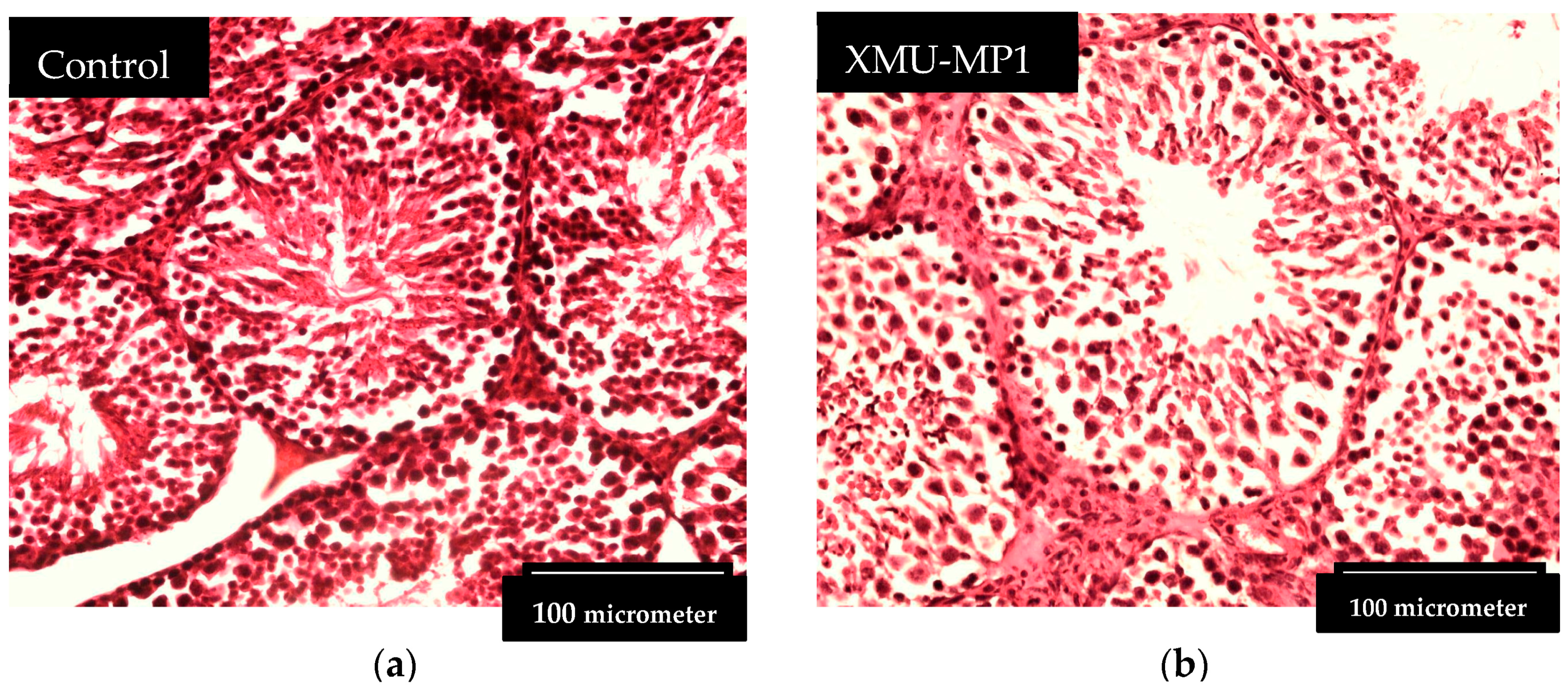
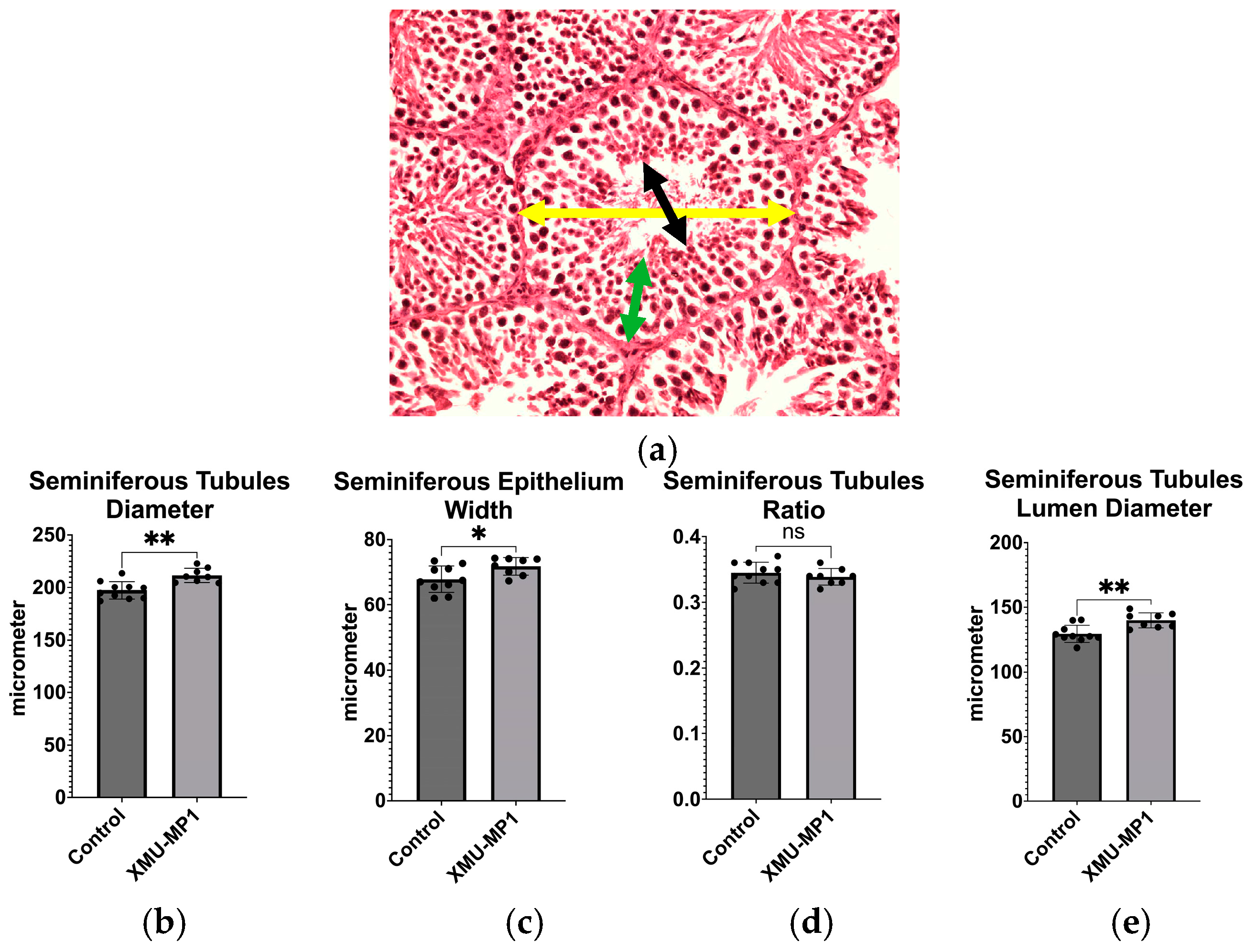
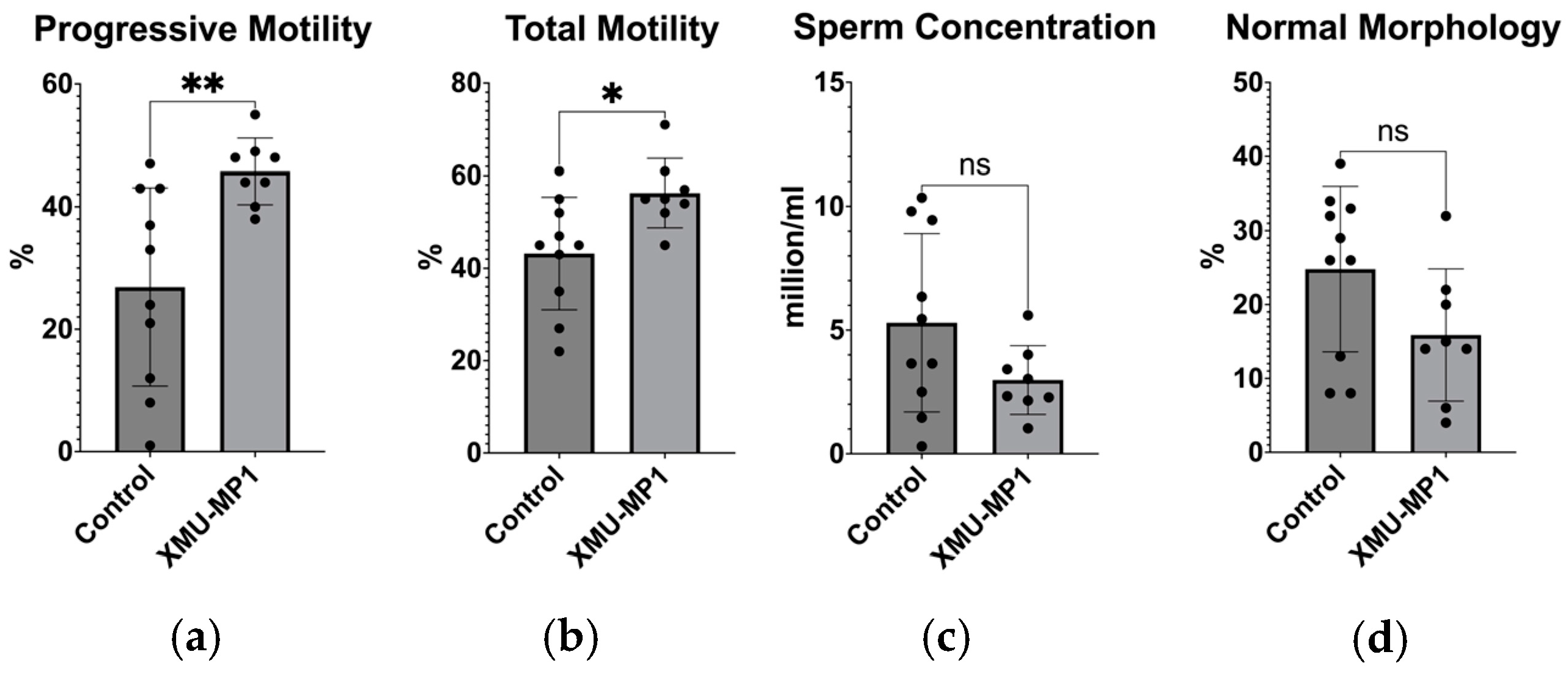
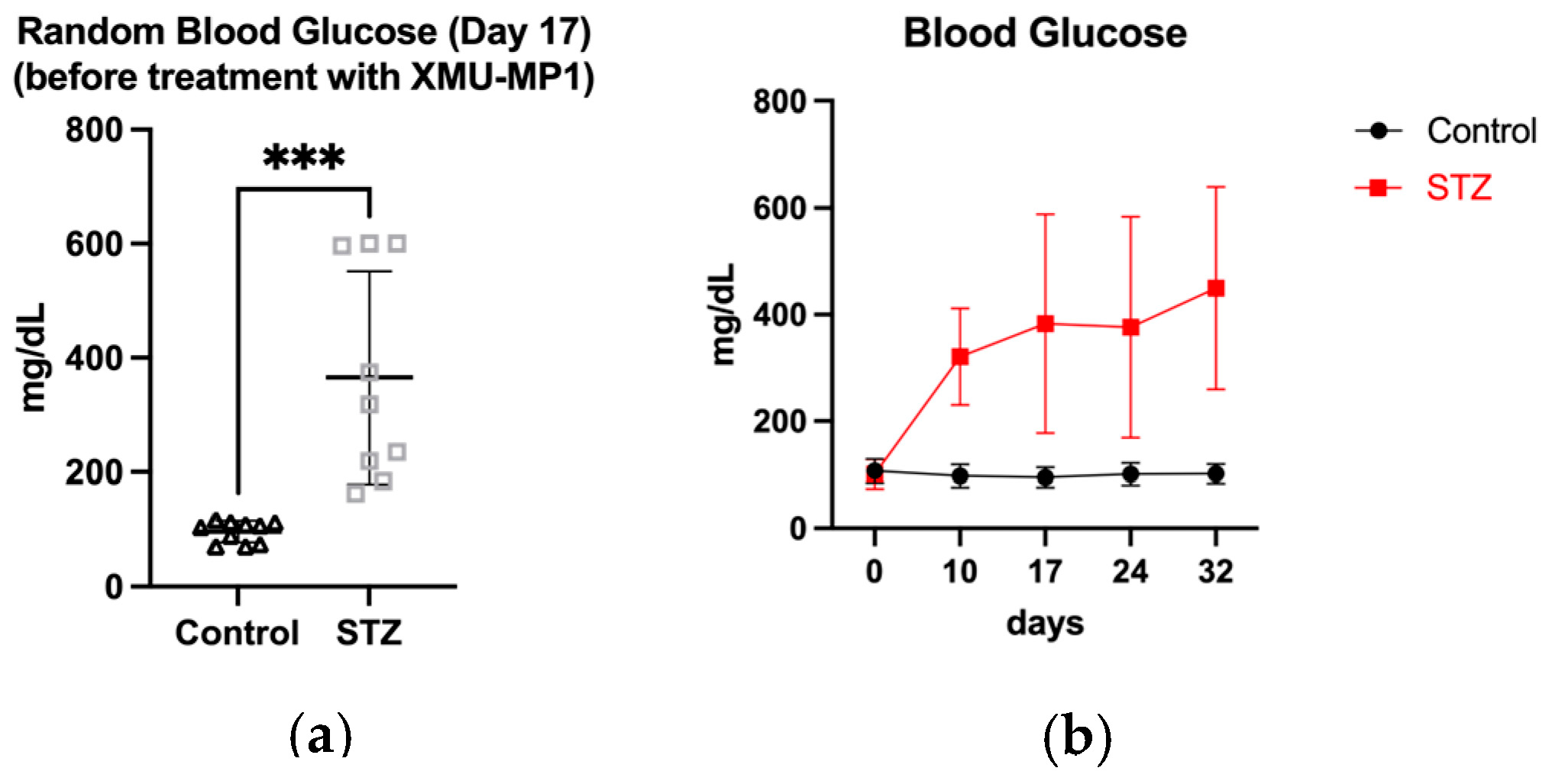
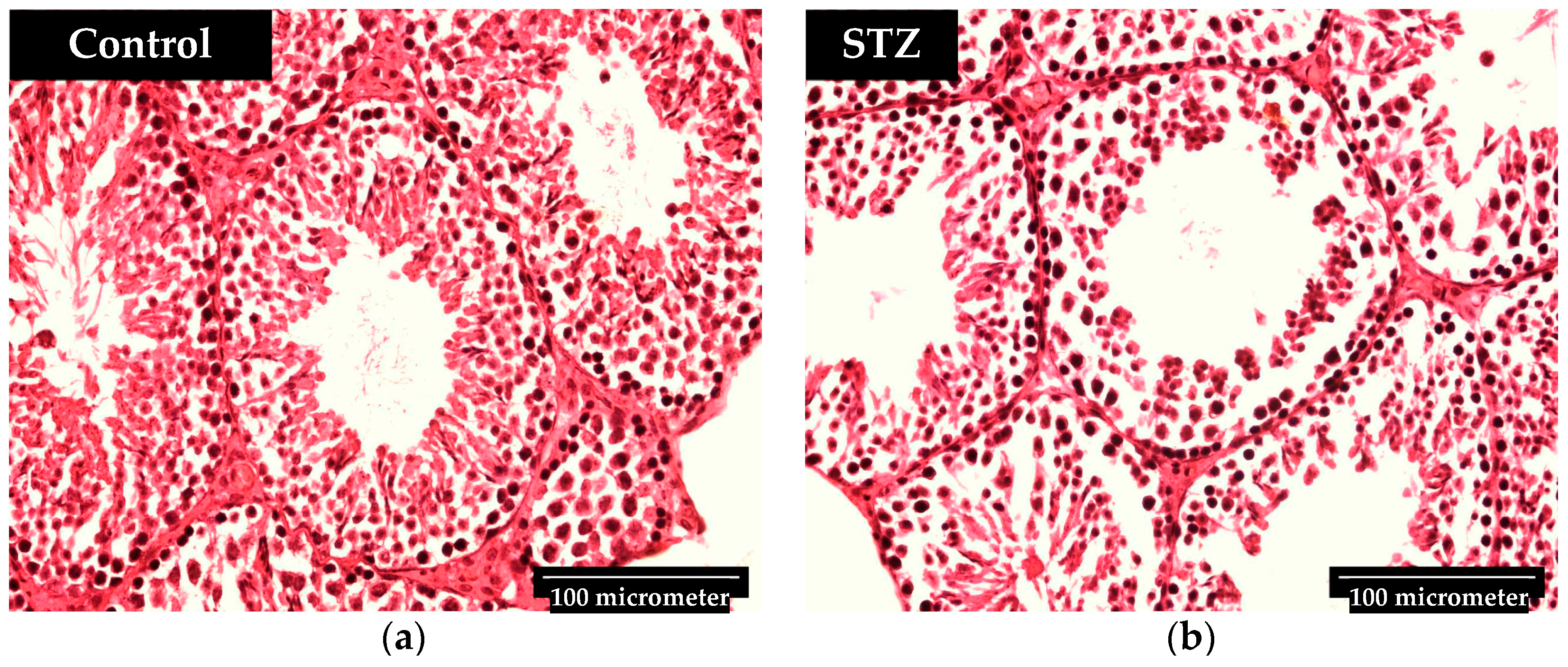

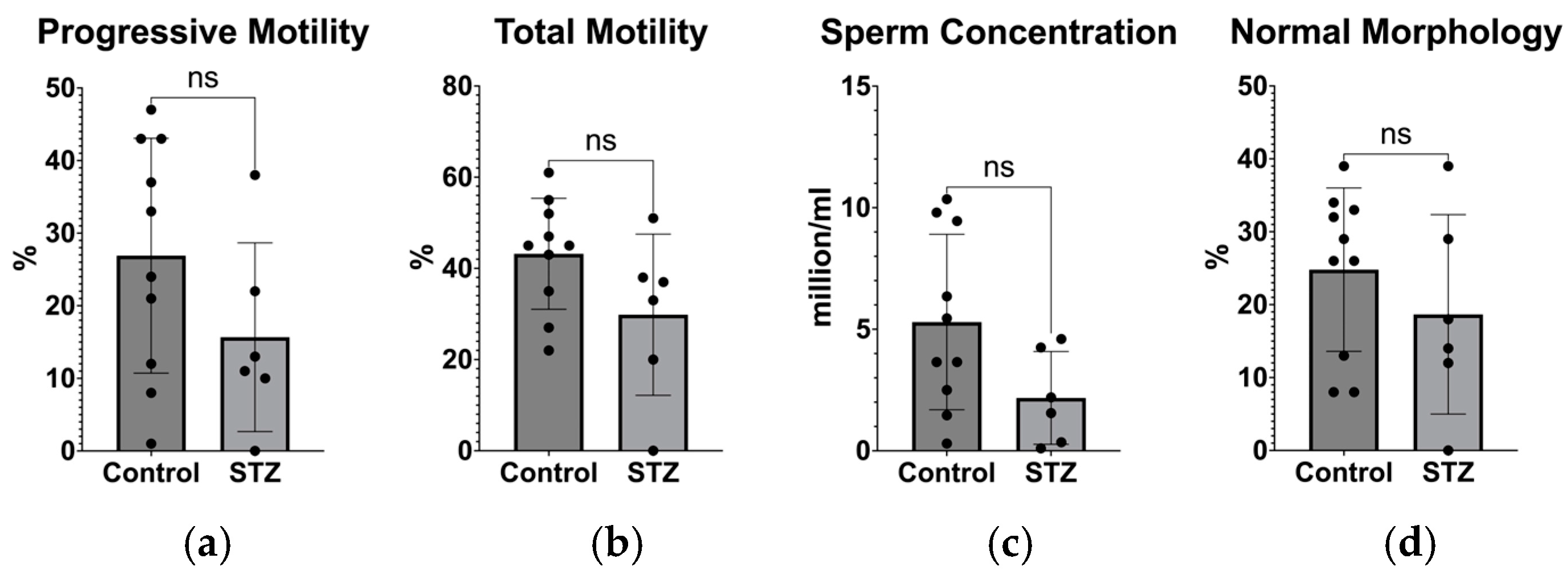
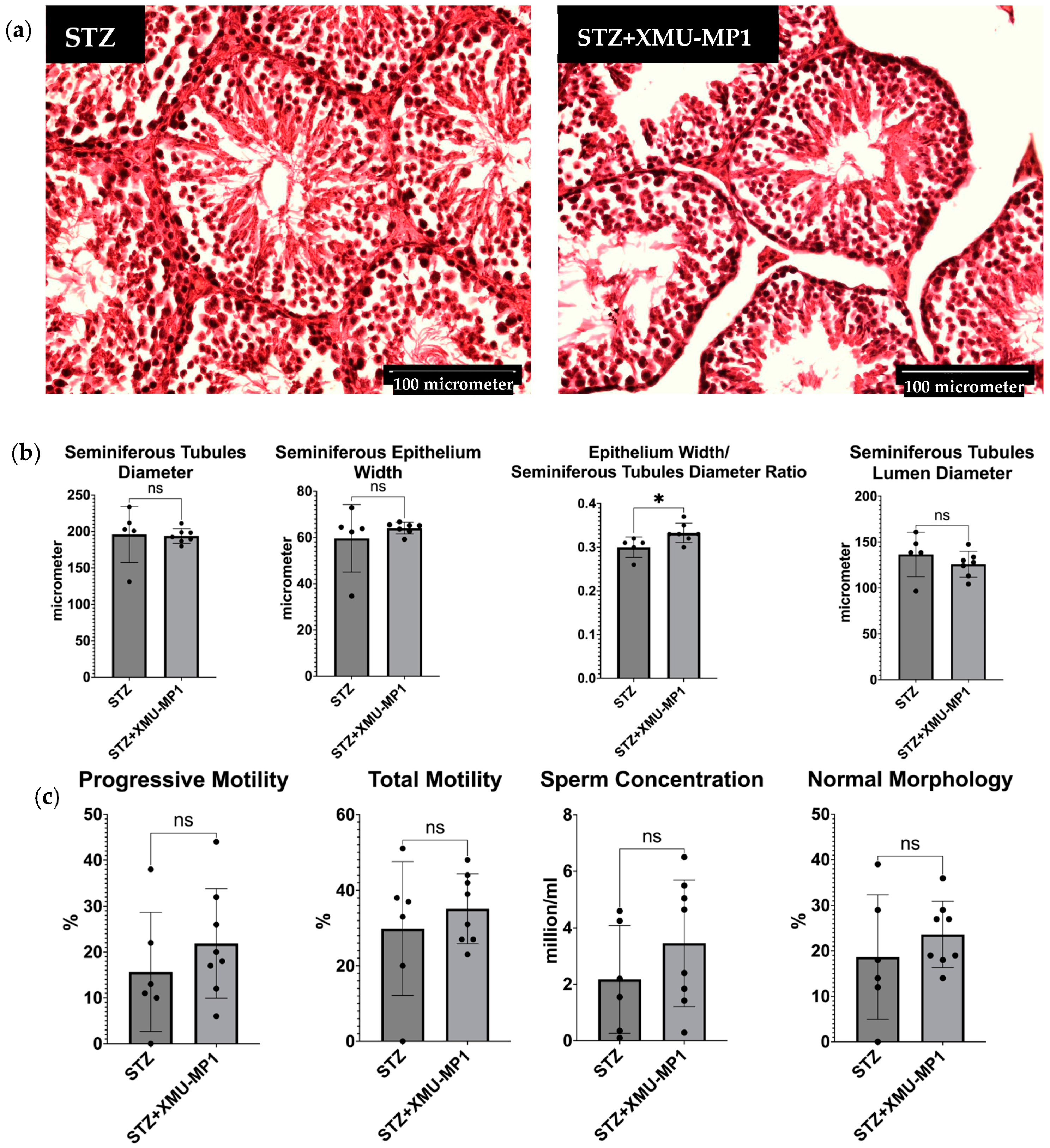
Disclaimer/Publisher’s Note: The statements, opinions and data contained in all publications are solely those of the individual author(s) and contributor(s) and not of MDPI and/or the editor(s). MDPI and/or the editor(s) disclaim responsibility for any injury to people or property resulting from any ideas, methods, instructions or products referred to in the content. |
© 2024 by the authors. Licensee MDPI, Basel, Switzerland. This article is an open access article distributed under the terms and conditions of the Creative Commons Attribution (CC BY) license (https://creativecommons.org/licenses/by/4.0/).
Share and Cite
Amanda, B.; Faizah, Z.; Pakpahan, C.; Aziz, M.A.; Hamidah, B.; Ashari, F.Y.; Oceandy, D. Mammalian Ste-20-like Kinase 1/2 (MST1/2) Inhibitor XMU-MP-1: A Potential Compound to Improve Spermatogenesis in Mouse Model of Diabetes Mellitus. Biomedicines 2024, 12, 2513. https://doi.org/10.3390/biomedicines12112513
Amanda B, Faizah Z, Pakpahan C, Aziz MA, Hamidah B, Ashari FY, Oceandy D. Mammalian Ste-20-like Kinase 1/2 (MST1/2) Inhibitor XMU-MP-1: A Potential Compound to Improve Spermatogenesis in Mouse Model of Diabetes Mellitus. Biomedicines. 2024; 12(11):2513. https://doi.org/10.3390/biomedicines12112513
Chicago/Turabian StyleAmanda, Bella, Zakiyatul Faizah, Cennikon Pakpahan, M. Aminudin Aziz, Berliana Hamidah, Faisal Yusuf Ashari, and Delvac Oceandy. 2024. "Mammalian Ste-20-like Kinase 1/2 (MST1/2) Inhibitor XMU-MP-1: A Potential Compound to Improve Spermatogenesis in Mouse Model of Diabetes Mellitus" Biomedicines 12, no. 11: 2513. https://doi.org/10.3390/biomedicines12112513
APA StyleAmanda, B., Faizah, Z., Pakpahan, C., Aziz, M. A., Hamidah, B., Ashari, F. Y., & Oceandy, D. (2024). Mammalian Ste-20-like Kinase 1/2 (MST1/2) Inhibitor XMU-MP-1: A Potential Compound to Improve Spermatogenesis in Mouse Model of Diabetes Mellitus. Biomedicines, 12(11), 2513. https://doi.org/10.3390/biomedicines12112513





